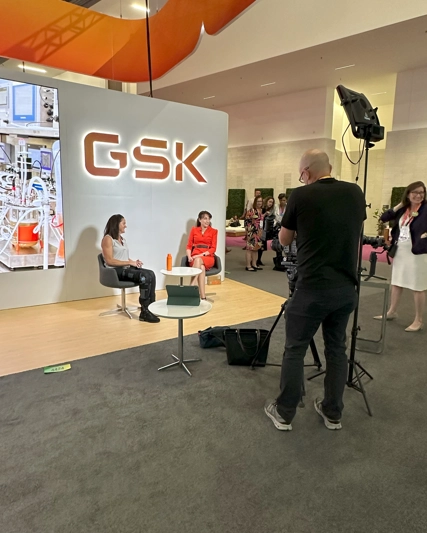Phase III CAPTAIN study of Trelegy Ellipta in patients with asthma meets primary endpoint
Issued: London UK – LSE announcement
GlaxoSmithKline plc (LSE/NYSE: GSK) and Innoviva, Inc. (NASDAQ: INVA) today announced headline results from the pivotal phase III CAPTAIN study of once-daily single inhaler triple therapy Trelegy Ellipta (fluticasone furoate/umeclidinium/vilanterol: FF/UMEC/VI) compared to Relvar/Breo Ellipta (FF/VI), in the treatment of patients living with uncontrolled asthma.
The study met its primary endpoint, demonstrating a statistically significant 110mL improvement in lung function (measured by change from baseline in trough FEV1 at 24 weeks of treatment) for FF/UMEC/VI 100/62.5/25mcg (p<0.001, 95% CI: 66-153 mL) compared with Relvar/Breo 100/25mcg and a statistically significant 92mL improvement in trough FEV1 for FF/UMEC/VI 200/62.5/25mcg versus Relvar/Breo 200/25mcg (p<0.001, 95% CI: 49-135 mL).
The key secondary endpoint was annualised rate of moderate/severe exacerbations for FF/UMEC/VI (100/62.5/25 and 200/62.5/25) versus Relvar/Breo (100/25 and 200/25) and demonstrated a 13% (95% CI: -5.2 to 28.1) reduction in exacerbations, however this was not statistically significant. Therefore, all subsequent analyses were considered descriptive.
Dr. Hal Barron, Chief Scientific Officer and President, R&D, GSK, said: “We believe a once-daily single inhaler triple therapy that improves lung function is an advance for patients with uncontrolled asthma since this option is not currently available. We plan to submit these data for regulatory review after the full dataset is available.”
CAPTAIN was also designed to investigate two further doses of FF/UMEC/VI (100/31.25/25 and 200/31.25/25 mcg) compared to Relvar/Breo (100/25 and 200/25). There were increases in trough FEV1 of a similar magnitude to those of FF/UMEC/VI 100/62.5/25 and 200/62.5/25, with no difference in exacerbation rates.
The safety profile of FF/UMEC/VI was consistent with the known profile of the individual components and their combinations. Adverse event rates were similar across all six study arms with the most common adverse events being reported as nasopharyngitis (13-15%), headache (5-9%), upper respiratory tract infection (3-6%) and bronchitis (3-5%).
Dr. Paul Meunier, Vice President of Respiratory Medicine at Innoviva noted that: “The CAPTAIN study has shown that triple therapy in a single inhaler provides a potential new treatment option for asthma management in patients uncontrolled on ICS/LABA.”
Full results from CAPTAIN will be submitted for future presentation at upcoming scientific meetings and in peer-reviewed publications.
About CAPTAIN
CAPTAIN (Clinical study of Asthma Patients receiving Triple therapy through A single INhaler) is a randomised, double-blind, active controlled, six-arm parallel group, global multicentre study evaluating FF/UMEC/VI (100/31.25/25, 100/62.5/25, 200/31.25/25 and 200/62.5/25 mcg) versus FF/VI (100/25 and 200/25 mcg) given once-daily to patients whose asthma is inadequately controlled despite treatment with ICS/LABA (>250mcg/day fluticasone propionate, or equivalent) maintenance asthma medication. In the study 2,436 patients were treated across 15 countries with approximately 400 patients randomly assigned to each of the six treatment arms.
CAPTAIN evaluated as its primary endpoint the change from baseline in trough Forced Expiratory Volume in 1 second (FEV1) at 24 weeks of treatment. The key secondary endpoint was the annualised rate of moderate/severe asthma exacerbations.
About Trelegy Ellipta (FF/UMEC/VI)
Trelegy Ellipta is a combination of three molecules in a single inhaler. It contains fluticasone furoate, an inhaled corticosteroid, umeclidinium, a long-acting muscarinic antagonist; and vilanterol, a long-acting beta agonist, delivered in GSK’s Ellipta dry powder inhaler. FF/UMEC/VI 100/62.5/25 has been approved under the brand name Trelegy Ellipta since 2017 for use in chronic obstructive pulmonary disease (COPD).
Trelegy Ellipta is indicated in the US for the long-term, once-daily, maintenance treatment of airflow obstruction in patients with COPD, including chronic bronchitis and/or emphysema. Trelegy Ellipta is also indicated to reduce exacerbations of COPD in patients with a history of exacerbations.
Trelegy Ellipta is not approved for the relief of acute bronchospasm or the treatment of asthma anywhere in the world.
Full US Prescribing Information, including Patient Information is available at: https://www.gsksource.com/pharma/content/dam/GlaxoSmithKline/US/en/Prescribing_Information/Trelegy/pdf/TRELEGY-PI-MG-IFU.PDF
Important Safety Information (ISI)
The following ISI is based on the Highlights section of the US Prescribing Information for Trelegy Ellipta. Please consult the full Prescribing Information for all the labelled safety information.
Trelegy Ellipta is NOT indicated for the relief of acute bronchospasm or for the treatment of asthma.
Trelegy Ellipta is contraindicated in patients with severe hypersensitivity to milk proteins or any of the ingredients.
LABA monotherapy increases the risk of serious asthma-related events.
Trelegy Ellipta should not be initiated in patients experiencing episodes of acutely deteriorating COPD. Do not use Trelegy Ellipta to treat acute symptoms.
Trelegy Ellipta should not be used in combination with other medicines containing LABA because of risk of overdose.
Candida albicans infection of the mouth and pharynx has occurred in patients treated with fluticasone furoate, a component of Trelegy Ellipta. Monitor patients periodically. Advise the patient to rinse his/her mouth with water without swallowing after inhalation to help reduce the risk.
There is an increased risk of pneumonia in patients with COPD taking Trelegy Ellipta. Monitor patients for signs and symptoms of pneumonia.
Patients who use corticosteroids are at risk for potential worsening of infections (e.g. existing tuberculosis; fungal, bacterial, viral, or parasitic infections; or ocular herpes simplex). Use Trelegy Ellipta with caution in patients with these infections. More serious or even fatal course of chickenpox or measles can occur in susceptible patients.
There is a risk of impaired adrenal function when transferring from systemic corticosteroids. Taper patients slowly from systemic corticosteroids if transferring to Trelegy Ellipta.
Hypercorticism and adrenal suppression may occur with very high dosages or at the regular dosage of Trelegy Ellipta in susceptible individuals. If such changes occur, consider appropriate therapy.
If paradoxical bronchospasm occurs, discontinue Trelegy Ellipta and institute alternative therapy.
Use Trelegy Ellipta with caution in patients with cardiovascular disorders because of beta-adrenergic stimulation.
Assess patents for decrease in bone mineral density initially and periodically thereafter after prescribing Trelegy Ellipta.
Consider referral to an ophthalmologist in patients who develop ocular symptoms or use Trelegy Ellipta long term. Worsening of narrow-angle glaucoma may occur. Use with caution in patients with narrow-angle glaucoma and instruct patients to contact a healthcare provider immediately if symptoms occur.
Worsening of urinary retention may occur in patients taking Trelegy Ellipta. Use with caution in patients with prostatic hyperplasia or bladder-neck obstruction and instruct patients to contact a healthcare provider immediately if symptoms occur.
Use Trelegy Ellipta with caution in patients with convulsive disorders, thyrotoxicosis, diabetes mellitus, and ketoacidosis.
Be alert to hypokalemia and hyperglycemia in patients taking Trelegy Ellipta.
The most common adverse reactions reported for Trelegy Ellipta (incidence ≥1%) are upper respiratory tract infection, pneumonia, bronchitis, oral candidiasis, headache, back pain, arthralgia, influenza, sinusitis, pharyngitis, rhinitis, dysgeusia, constipation, urinary tract infection, diarrhea, gastroenteritis, oropharyngeal pain, cough, and dysphonia.
About asthma
Asthma is a chronic lung disease that inflames and narrows the airways. Asthma affects 358 million people worldwide. Despite medical advances, more than half of patients continue to experience poor control and significant symptoms. At least 30% of patients adherent to ICS/LABA therapy remain uncontrolled which can negatively impact their lives.
The causes of asthma are not completely understood but likely involve an interaction between a person’s genetic make-up and the environment. Key risk factors are inhaled substances that provoke allergic reactions or irritate the airways.
GSK’s commitment to respiratory disease
For 50 years, GSK has led the way in developing medicines that advance the management of asthma and COPD. From introducing the world’s first selective short-acting beta agonist in 1969, to launching six treatments in five years to create today’s industry-leading respiratory portfolio, we continue to innovate so we can reach the right patients, with the right treatment. Working together with the healthcare community, we apply world-class science to discover and understand the molecules that become the medicines of tomorrow. We won’t stand still until the simple act of breathing is made easier for everyone.
GSK - a science-led global healthcare company with a special purpose: to help people do more, feel better, live longer. For further information please visit www.gsk.com.
Trade marks are owned by or licensed to the GSK group of companies.
Innoviva – Innoviva is focused on royalty management. Innoviva's portfolio is anchored by the respiratory assets partnered with Glaxo Group Limited (GSK), including RELVAR®/BREO® ELLIPTA®, ANORO® ELLIPTA® and TRELEGY® ELLIPTA®, which were jointly developed by Innoviva and GSK. Under the agreement with GSK, Innoviva is eligible to receive associated royalty revenues from RELVAR®/BREO® ELLIPTA® and ANORO® ELLIPTA®. In addition, Innoviva retains a 15 percent economic interest in future payments made by GSK for TRELEGY® ELLIPTA® and earlier-stage programs partnered with Theravance Biopharma, Inc. For more information, please visit Innoviva's website at www.inva.com.
GSK enquiries
UK Media enquiries:
- Simon Steel +44 (0) 20 8047 5502 (London)
- Tim Foley +44 (0) 20 8047 5502 (London)
US Media enquiries:
- Karen Hagens +1 919 483 2863 (North Carolina)
Analyst/Investor enquiries:
- Sarah Elton-Farr +44 (0) 20 8047 5194 (London)
- James Dodwell +44 (0) 20 8047 2406 (London)
- Danielle Smith +44 (0) 20 8047 7562 (London)
- Jeff McLaughlin +1 215 751 7002 (Philadelphia)
Innoviva, Inc. enquiries
Investor and Media:
- Dan Zacchei dzacchei@sloanepr.com +1 (212) 446 9500 (California)
- Alex Kovtun akovtun@sloaneprr.com +1 (212) 446 9500 (California)
Cautionary statement regarding forward-looking statements
GSK cautions investors that any forward-looking statements or projections made by GSK, including those made in this announcement, are subject to risks and uncertainties that may cause actual results to differ materially from those projected. Such factors include, but are not limited to, those described under Item 3.D Principal risks and uncertainties in the company's Annual Report on Form 20-F for 2018.
Innoviva forward-looking statements
This press release contains certain "forward-looking" statements as that term is defined in the Private Securities Litigation Reform Act of 1995 regarding, among other things, statements relating to goals, plans, objectives and future events, including the development, regulatory and commercial plans for closed triple combination therapy and the potential benefits and mechanisms of action of closed triple combination therapy. Innoviva intends such forward-looking statements to be covered by the safe harbor provisions for forwardlooking statements contained in Section 21E of the Securities Exchange Act of 1934 and the Private Securities Litigation Reform Act of 1995. Such forward-looking statements involve substantial risks, uncertainties and assumptions. These statements are based on the current estimates and assumptions of the management of Innoviva as of the date of this press release and are subject to risks, uncertainties, changes in circumstances, assumptions and other factors that may cause the actual results of Innoviva to be materially different from those reflected in the forward-looking statements. Important factors that could cause actual results to differ materially from those indicated by such forward-looking statements are described under the headings "Risk Factors" and "Management's Discussion and Analysis of Financial Condition and Results of Operations" contained in Innoviva's Annual Report on Form 10-K for the year ended December 31, 2018, which is on file with the Securities and Exchange Commission (SEC) and available on the SEC's website at www.sec.gov. Additional factors may be described in those sections of Innoviva's Quarterly Report on Form 10-Q for the quarter ended March 31, 2019, to be filed with the SEC in the second quarter of 2018. In addition to the risks described above and in Innoviva's other filings with the SEC, other unknown or unpredictable factors also could affect Innoviva's results. No forward-looking statements can be guaranteed and actual results may differ materially from such statements. Given these uncertainties, you should not place undue reliance on these forward-looking statements. The information in this press release is provided only as of the date hereof, and Innoviva assumes no obligation to update its forward-looking statements on account of new information, future events or otherwise, except as required by law. (INVA-G)

